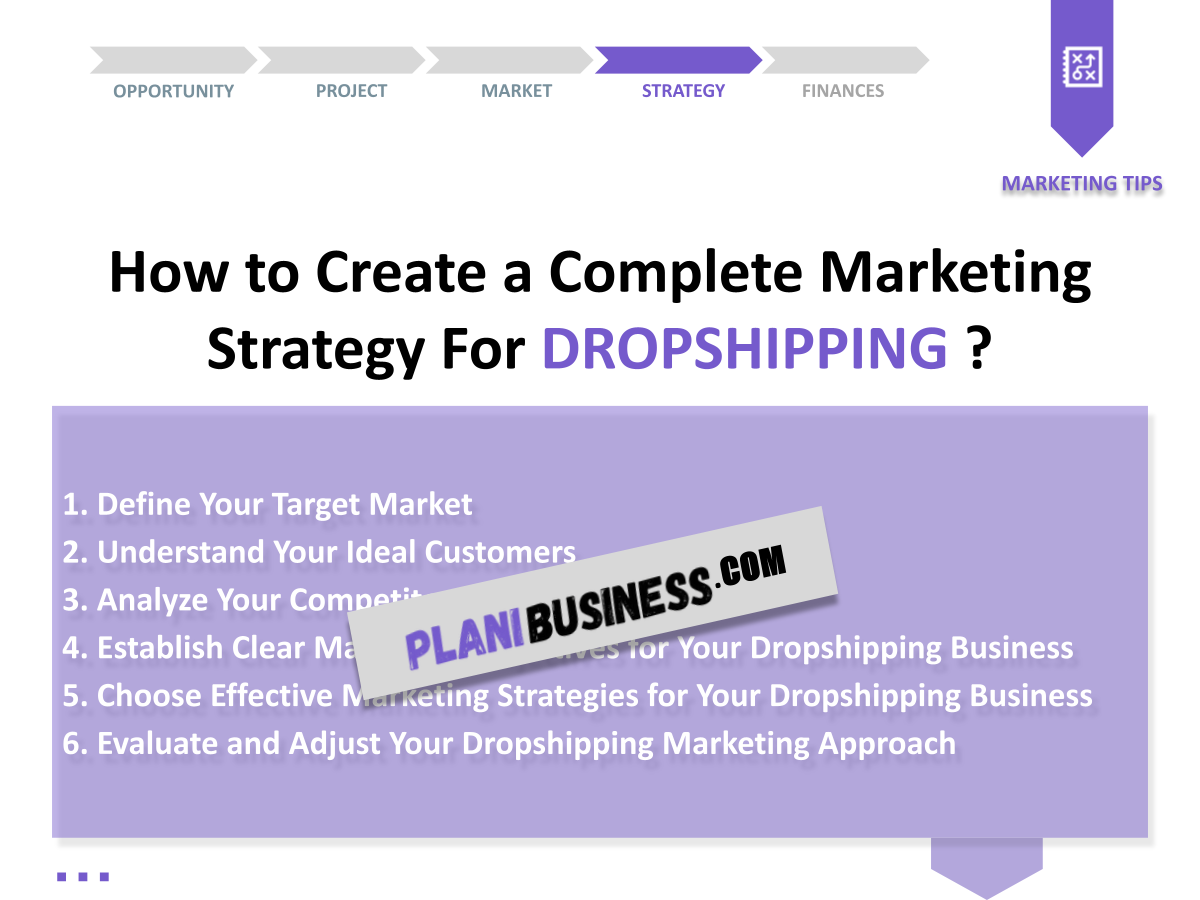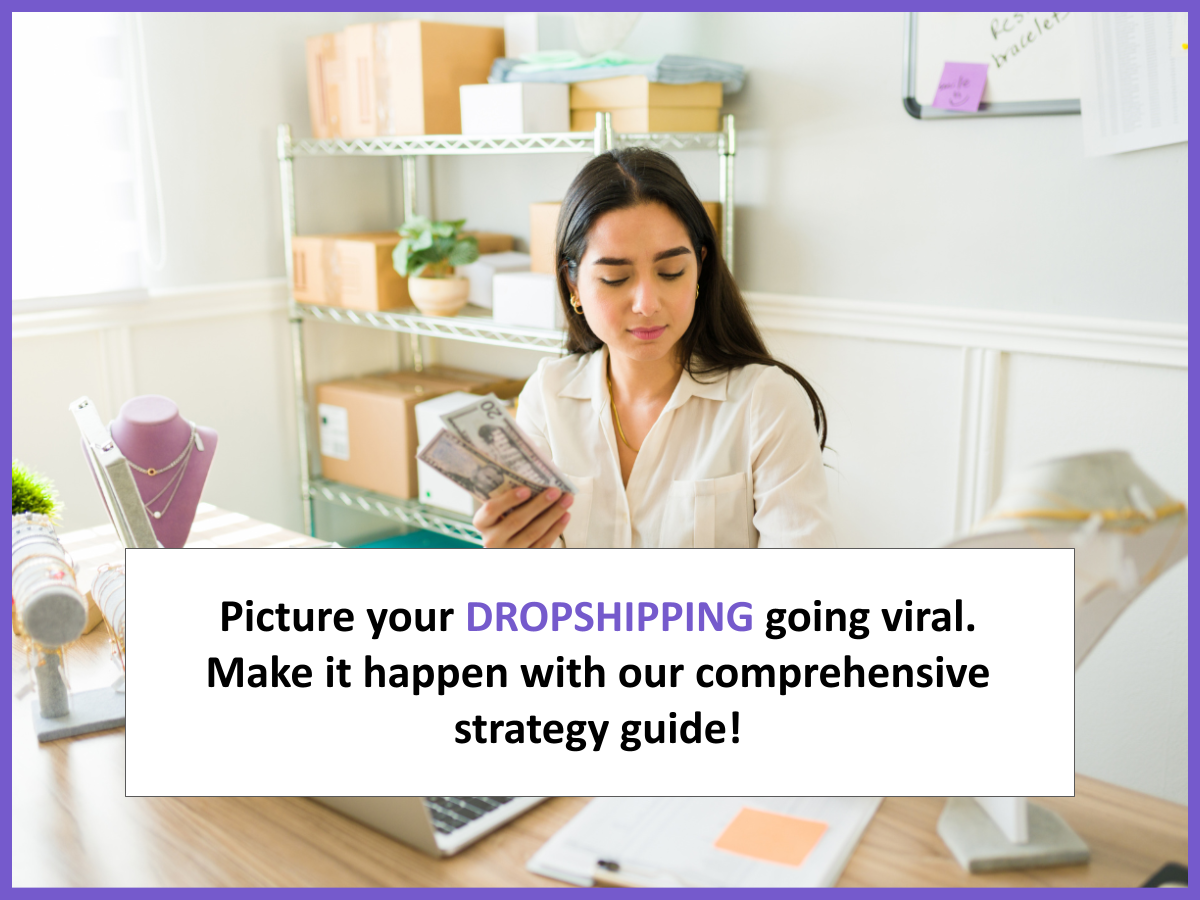Are you thinking about starting a dropshipping business? You’re not alone! In fact, the dropshipping industry has seen a surge of over 30% in recent years, attracting many aspiring entrepreneurs looking to make their mark. A well-crafted Dropshipping Marketing Plan is essential for standing out in this competitive market. It helps you define your target audience, choose the right marketing channels, and ultimately drive sales.
In this article, we’ll explore:
- How to define your target market
- Understanding your ideal customers
- Analyzing your competitors
- Setting clear marketing objectives
- Choosing effective marketing strategies
- Real-life examples of successful marketing plans
1. Define Your Target Market
| Aspect | Details |
|---|---|
| Demographics | Age, gender, income level, etc. |
| Geographics | Regions or countries where you will sell. |
| Psychographics | Interests, lifestyle, and values of potential customers. |
Understanding your target market is the first step to a successful Dropshipping Marketing Plan. It involves researching who your customers are and what they want. Start by identifying key demographics such as age, gender, and income level. Then, consider the geographic regions where you plan to sell your products. Lastly, dive into psychographics by exploring the interests, lifestyles, and values of your potential customers. This comprehensive approach will help you create tailored marketing messages that resonate with your audience.
2. Understand Your Ideal Customers
| Customer Profile | Characteristics |
|---|---|
| Millennials | Tech-savvy, value convenience, and sustainability. |
| Parents | Looking for products that save time and money. |
Knowing your ideal customers helps tailor your messaging and product offerings to their needs. For instance, if your target audience includes millennials, focus on the convenience and sustainability of your products. On the other hand, if you are targeting parents, emphasize how your offerings can save them time and money. This level of understanding allows you to create marketing campaigns that speak directly to your audience’s desires and pain points.
3. Analyze Your Competitors
| Competitor | Strengths | Weaknesses |
|---|---|---|
| Competitor A | Strong brand presence | Higher prices |
| Competitor B | Wide product range | Poor customer service |
| Competitor C | Excellent marketing strategies | Limited shipping options |
Understanding your competitors is vital for developing a robust Dropshipping Marketing Plan. By analyzing their strengths and weaknesses, you can identify opportunities in the market. For example, if Competitor A has a strong brand presence but charges higher prices, you might consider positioning your products as more affordable alternatives. Similarly, if Competitor B has a wide range of products but offers poor customer service, you can emphasize exceptional customer support in your marketing strategies. This competitive analysis not only helps you find your niche but also allows you to refine your unique selling propositions.
4. Establish Clear Marketing Objectives for Your Dropshipping Business
| Objective | Measurable Goal |
|---|---|
| Increase Brand Awareness | Reach 10,000 followers on social media |
| Boost Sales | Achieve a 20% increase in monthly sales |
| Improve Customer Retention | Increase repeat purchases by 15% |
Setting specific, measurable objectives gives you a clear direction for your marketing efforts. For instance, if your goal is to increase brand awareness, aim to reach a specific number of followers on social media platforms. Similarly, if you want to boost sales, set a target percentage for monthly sales increases. Additionally, consider improving customer retention by encouraging repeat purchases. These objectives will guide your marketing strategies and help you measure success over time.
5. Choose Effective Marketing Strategies for Your Dropshipping Business
| Strategy | Description |
|---|---|
| Social Media Marketing | Engaging with customers on platforms like Instagram and Facebook. |
| Email Marketing | Sending targeted campaigns to your subscriber list. |
| Content Marketing | Creating valuable content to attract and retain customers. |
Your Dropshipping Marketing Plan should include various marketing strategies tailored to your audience. For example, social media marketing is a powerful way to connect with potential customers and showcase your products visually. Platforms like Instagram and Facebook allow you to engage directly with your audience, run promotions, and build brand loyalty.
Email marketing is another effective strategy. By sending targeted campaigns to your subscriber list, you can keep your audience informed about new products, special offers, and updates. Don’t underestimate the power of content marketing either. Creating valuable blog posts, videos, or infographics can help attract and retain customers while establishing your brand as an authority in your niche.
6. Evaluate and Adjust Your Dropshipping Marketing Approach
| Metric | Action |
|---|---|
| Conversion Rate | Optimize landing pages to increase sales. |
| Traffic Sources | Invest more in the channels that bring the most visitors. |
| Customer Feedback | Use surveys to improve products and services. |
Regular evaluation of your marketing performance is crucial to adapting your strategies for maximum effectiveness. Start by monitoring your conversion rate. If it’s low, consider optimizing your landing pages to make them more appealing and user-friendly.
Additionally, keep an eye on your traffic sources. If certain channels are driving more visitors than others, it may be wise to invest more resources into those areas. Don’t forget about customer feedback. Using surveys can help you gather insights that allow you to improve your products and services, ensuring that you meet your customers’ needs effectively.
7. Example N°1 of Marketing Plan for Dropshipping
| Steps | Actions | Details |
|---|---|---|
| 1 | Target Market | Identify primary customer demographics such as age and income. |
| 2 | Ideal Customers | Define key characteristics and needs, focusing on their lifestyle. |
| 3 | Competitors | Research strengths and weaknesses of key competitors. |
| 4 | Marketing Objectives | Set specific, measurable goals like increasing sales by 20%. |
| 5 | Marketing Strategies | Choose strategies such as social media and email marketing. |
| 6 | Evaluation | Analyze data and adjust strategies based on performance metrics. |
This example outlines a straightforward Dropshipping Marketing Plan that any entrepreneur can follow. Start by identifying your target market and understanding who your ideal customers are. Next, conduct a competitive analysis to see where you stand against others in the industry. After setting clear marketing objectives, choose effective strategies that align with your goals. Finally, make sure to regularly evaluate your approach to continuously improve your results.
8. Example N°2 of Marketing Plan for Dropshipping
| Steps | Actions | Details |
|---|---|---|
| 1 | Target Market | Focus on eco-conscious consumers looking for sustainable products. |
| 2 | Ideal Customers | Identify customers who prioritize eco-friendliness in their purchasing decisions. |
| 3 | Competitors | Analyze competitors who also market sustainable products. |
| 4 | Marketing Objectives | Aim for a 30% increase in social media engagement within three months. |
| 5 | Marketing Strategies | Implement influencer partnerships and content focused on sustainability. |
| 6 | Evaluation | Use analytics tools to track engagement and sales conversions. |
This example illustrates a Dropshipping Marketing Plan tailored for a niche market focused on sustainability. By identifying eco-conscious consumers as your target audience, you can create tailored messages that resonate with their values. Engaging with influencers who share a passion for sustainability can amplify your brand’s reach. Finally, regularly evaluate your performance using analytics to ensure you are meeting your objectives and making necessary adjustments.
9. Example N°3 of Marketing Plan for Dropshipping
| Steps | Actions | Details |
|---|---|---|
| 1 | Target Market | Identify tech-savvy young adults interested in gadgets. |
| 2 | Ideal Customers | Focus on early adopters who love the latest tech innovations. |
| 3 | Competitors | Research leading tech dropshippers in the market. |
| 4 | Marketing Objectives | Achieve a 25% increase in email list sign-ups. |
| 5 | Marketing Strategies | Utilize tech blogs and YouTube reviews for promotion. |
| 6 | Evaluation | Measure success through email open rates and conversion rates. |
This Dropshipping Marketing Plan example focuses on a niche within the technology sector. By targeting tech-savvy young adults, you can create marketing content that highlights the latest gadgets and their benefits. Collaborating with tech bloggers and influencers can help you reach a wider audience and build credibility. To measure your success, track email sign-up rates and conversion rates to ensure your marketing efforts are effective.
10. Example N°4 of Marketing Plan for Dropshipping
| Steps | Actions | Details |
|---|---|---|
| 1 | Target Market | Focus on fitness enthusiasts looking for workout gear. |
| 2 | Ideal Customers | Identify individuals who prioritize health and wellness. |
| 3 | Competitors | Analyze top fitness apparel brands in dropshipping. |
| 4 | Marketing Objectives | Increase website traffic by 40% through SEO. |
| 5 | Marketing Strategies | Implement SEO strategies and create engaging fitness content. |
| 6 | Evaluation | Use Google Analytics to track website traffic and engagement. |
This Dropshipping Marketing Plan targets fitness enthusiasts who are always on the lookout for the latest workout gear. By identifying your ideal customers and understanding their needs, you can tailor your marketing messages to resonate with their health-conscious lifestyle. Implementing SEO strategies will help increase your website traffic, while creating engaging content related to fitness can keep your audience coming back for more. Regularly check Google Analytics to evaluate your traffic and engagement metrics, allowing you to adjust your strategies as needed.
11. Example N°5 of Marketing Plan for Dropshipping
| Steps | Actions | Details |
|---|---|---|
| 1 | Target Market | Identify pet owners looking for high-quality pet products. |
| 2 | Ideal Customers | Focus on pet lovers who prioritize their pets’ health and happiness. |
| 3 | Competitors | Analyze leading dropshipping brands in the pet industry. |
| 4 | Marketing Objectives | Boost social media engagement by 50% within six months. |
| 5 | Marketing Strategies | Use engaging social media posts and user-generated content. |
| 6 | Evaluation | Track engagement metrics and adjust strategies accordingly. |
This Dropshipping Marketing Plan example focuses on pet owners who are passionate about providing the best for their furry friends. By targeting this market, you can create engaging content that highlights the quality and benefits of your products. Utilizing social media platforms to share user-generated content can help you build a community around your brand. To measure success, track your engagement metrics and be ready to adjust your strategies based on what resonates most with your audience.
12. Example N°6 of Marketing Plan for Dropshipping
| Steps | Actions | Details |
|---|---|---|
| 1 | Target Market | Identify home decor enthusiasts looking for unique items. |
| 2 | Ideal Customers | Focus on individuals who appreciate aesthetics and design. |
| 3 | Competitors | Analyze top competitors in the home decor dropshipping niche. |
| 4 | Marketing Objectives | Increase monthly website visits by 35% through content marketing. |
| 5 | Marketing Strategies | Create visually appealing content showcasing products. |
| 6 | Evaluation | Monitor website analytics to assess traffic sources and behavior. |
This Dropshipping Marketing Plan targets home decor enthusiasts who are always on the lookout for unique and aesthetically pleasing items. By understanding your ideal customers, you can create visually appealing content that showcases your products in a way that resonates with their tastes. Content marketing can be particularly effective in this niche, as beautiful images and engaging descriptions can draw potential customers in. Regularly monitor your website analytics to evaluate traffic sources and user behavior, allowing you to refine your approach for better results.
13. Example N°7 of Marketing Plan for Dropshipping
| Steps | Actions | Details |
|---|---|---|
| 1 | Target Market | Identify beauty product consumers interested in natural ingredients. |
| 2 | Ideal Customers | Focus on individuals who prioritize skincare and health. |
| 3 | Competitors | Research top natural beauty brands in dropshipping. |
| 4 | Marketing Objectives | Achieve a 20% increase in sales through targeted promotions. |
| 5 | Marketing Strategies | Leverage influencer marketing and beauty blogs for outreach. |
| 6 | Evaluation | Assess sales performance and customer feedback for insights. |
This final Dropshipping Marketing Plan example focuses on consumers interested in natural beauty products. By identifying your target market and understanding their values, you can tailor your marketing efforts to highlight the benefits of your offerings. Utilizing influencer marketing can be a powerful way to reach a broader audience, as beauty influencers can effectively communicate the advantages of your products. Regularly evaluate your sales performance and gather customer feedback to refine your strategies and improve your offerings.
Conclusion
Creating a successful Dropshipping Marketing Plan involves a deep understanding of your target market, ideal customers, and competitors. By setting clear objectives and selecting effective marketing strategies, you can drive sales and grow your business. Remember to regularly evaluate your performance and adjust your approach based on the data you gather.
If you’re looking for a comprehensive guide to help you structure your business model, check out this business plan template for Dropshipping. It provides valuable insights and frameworks to enhance your planning process.
For more information, don’t forget to read our articles on How to Kickstart a Dropshipping Business? and How to Create a SWOT Analysis for Dropshipping. These resources will equip you with the knowledge needed to succeed in the dropshipping landscape.
FAQ
-
What is a dropshipping marketing plan?
A dropshipping marketing plan is a strategic outline that details how you will promote and sell your products through dropshipping. It includes your target market, marketing objectives, and strategies.
-
How do I choose the right niche for dropshipping?
Choosing the right niche involves researching market trends, understanding consumer demand, and analyzing competition. Look for niches with high demand and low competition for the best chances of success.
-
What marketing strategies work best for dropshipping?
Effective marketing strategies for dropshipping include social media marketing, email marketing, and content marketing. Leveraging influencer partnerships can also enhance your reach.
-
How can I evaluate my marketing performance?
You can evaluate your marketing performance by monitoring key metrics such as conversion rates, website traffic, and customer engagement. Tools like Google Analytics can provide valuable insights.
-
Is dropshipping a profitable business model?
Yes, dropshipping can be profitable if managed well. Success depends on choosing the right products, effective marketing, and efficient supplier relationships.
-
What are common challenges in dropshipping?
Common challenges include supplier issues, inventory management, and maintaining product quality. Addressing these challenges proactively is key to success.
-
How do I find reliable suppliers for dropshipping?
Finding reliable suppliers can be done through platforms like AliExpress, Oberlo, or SaleHoo. Always check reviews and request samples to ensure quality.
-
What are some effective ways to drive traffic to my dropshipping store?
Effective ways to drive traffic include SEO optimization, running paid ads, and utilizing social media platforms to engage potential customers.
-
How important is branding in dropshipping?
Branding is crucial in dropshipping as it helps differentiate your business from competitors. A strong brand can build customer loyalty and trust.
-
Can I run a dropshipping business part-time?
Yes, many entrepreneurs start dropshipping as a part-time venture. It allows flexibility, but be prepared to invest time and effort into marketing and customer service.







